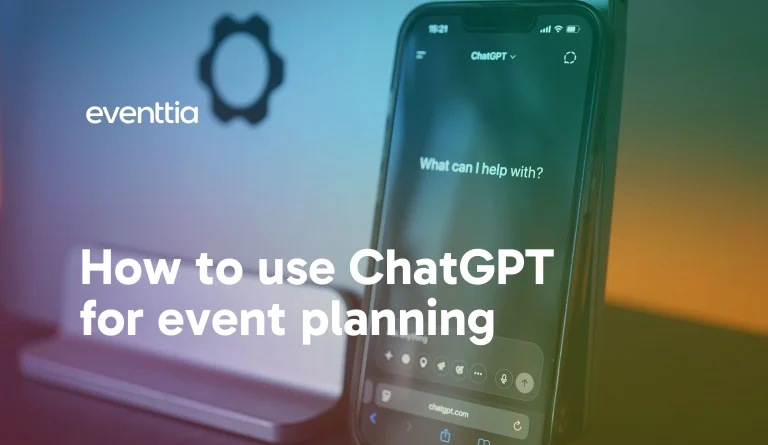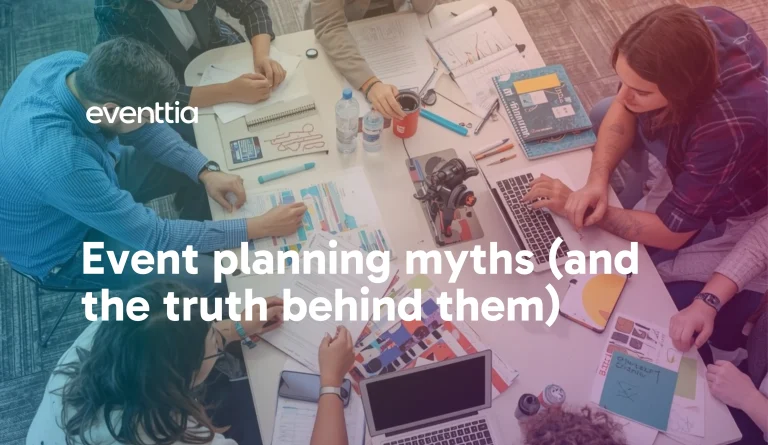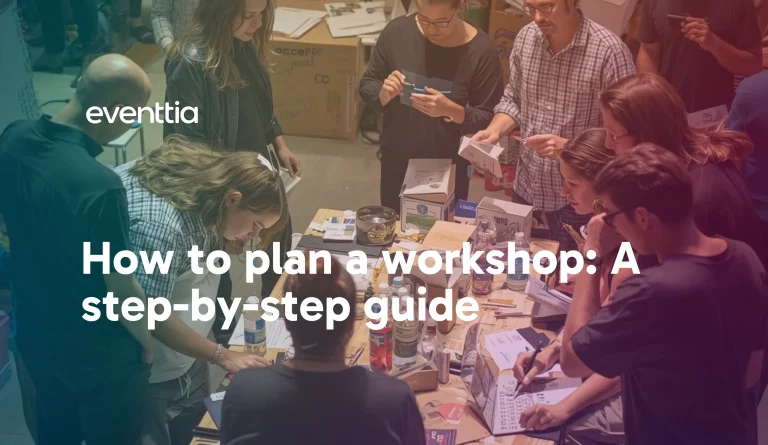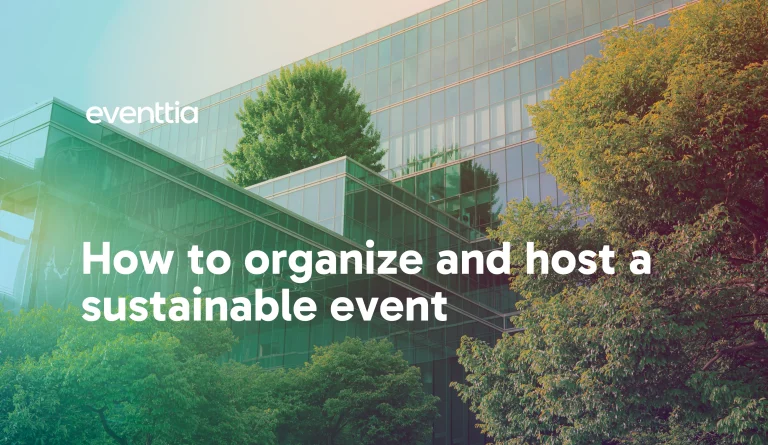Event planning is one of the fastest-evolving industries in 2025. The global events market, valued at USD 1.406 trillion in 2024, is projected to grow steadily and surpass USD 2.3 trillion by 2034, reflecting consistent year-over-year expansion.
Meanwhile, attendees are demanding more than just well-executed logistics: they want personalized, fun, and purpose-driven experiences. At the same time, sustainability and inclusivity are rising to the top of the agenda, and organizers are under pressure to demonstrate ROI, attendee engagement, and meaningful connections, not just high registration numbers.
That’s where ChatGPT comes in. While it can’t replace the hands-on capabilities of an event management platform like Eventtia, which provides tools for registration, ticketing, event marketing, and reporting, it can act as your creative partner, research assistant, and content generator at every stage of the planning process.
This guide will show you exactly how to use ChatGPT for event planning, with practical examples, copy/paste-ready prompts, and pro tips for pairing it with Eventtia to streamline workflows, delight attendees, and stay ahead of industry trends.
Using ChatGPT at Different Stages of Event Planning
You can leverage ChatGPT across the entire event lifecycle:
- Event Strategy: Brainstorming concepts, logistics, sponsors, and speakers
- Event Registration: Streamlining registration, ticketing and payments, customer support and post-event surveys
- Event Marketing: Creating content for social media, emails, press releases, and websites
Let’s explore each in detail.
Using ChatGPT for Event Strategy
Strong event strategy lays the foundation for success. ChatGPT helps you explore new ideas, refine them, and draft frameworks you can then execute using Eventtia.
Researching Event Concepts
Different audiences respond to different event formats. ChatGPT can help you explore what resonates best, whether you’re planning a tech conference, charity gala, student recruitment fair, or music festival.
Example Prompts:
“I’m an event marketer planning a future-focused event tech conference for event planners, event marketers, and early adopters. It will be hybrid, inclusive, and allow both in-person and virtual delegates. Suggest five possible event themes in no more than 50 words each.”
“Our nonprofit wants to host a fundraising gala for climate change. What types of event formats and activities would most effectively attract donors aged 30–50?”
“What are the most popular formats for university student recruitment events in 2025, and how can we make ours stand out?”
Our Tip: Always ask ChatGPT for multiple ideas when it comes to event themes. You can then bring your favorites to a team brainstorming session and refine them internally to suit your target audience better.
Brainstorming Creative Ideas
The event market is crowded, and you’re likely fighting for attendees’ attention. A great way to help them choose your event is to give it a unique twist. From themes to dress codes to unexpected elements that make your event truly memorable, ChatGPT can spark creativity that elevates your event experience.
Example Prompts:
“Suggest 10 creative gala themes for a charity ball raising money for children’s hospitals. Include a recommended color palette and decor style for each.”
“I am planning a corporate holiday party for a 500-person finance company. We want it to feel modern, inclusive, and fun. Suggest themes, entertainment options, and dress codes.”
“Provide 5 ways to incorporate interactive technology elements into a sustainability conference to keep delegates engaged.”
Our Tip: The more background information you can give ChatGPT about your event and target audience, the more likely you are to get creative ideas you can actually use.
Event Logistics
Budgets, venues, and vendors often determine whether an event is viable. ChatGPT can create draft budgets, shortlist venue criteria, and generate vendor checklists. By transferring some of the more mundane tasks of event strategy to AI tools, you’ll have more time to focus on the bigger picture.
Example Prompts:
“Draft a detailed sample budget for a 200-person corporate seminar in New York City, including venue rental, catering, AV, staffing, and marketing.”
“Provide a venue comparison framework for choosing between three options for a hybrid trade show: factors should include accessibility, technology, catering, and sustainability.”
“Create a vendor checklist for a 5,000-person outdoor music festival, covering staging, security, power, waste management, and medical support.”
Our Tip: Don’t expect ChatGPT to create a budget for your event perfectly, but it will give you something you can refine and build from.
Identifying Sponsors or Speakers
High-profile speakers are a great way to get your event on your attendees’ radar, and sponsors are often an important part of financing your event. AI can help brainstorm target sponsors, suggest relevant speakers, and even draft outreach messages.
Example Prompts:
“I am organizing a leadership summit for women in tech in San Francisco. Suggest 15 potential keynote speakers across industries (tech, venture capital, academia).”
“Suggest potential corporate sponsors for a youth sports tournament in Chicago. Provide rationale for why each brand would be interested.”
“Draft a professional, persuasive sponsorship request email to a Fortune 500 company for a nonprofit fundraising gala. Include a catchy subject line and three key points outlining why they should sponsor this event.”
Our Tip: If you already have some names of speakers or sponsors in mind, add these to your prompts. ChatGPT can then provide similar options that help keep its suggestions targeted and relevant.
Once attendees can register, the next challenge is getting them excited, that’s where marketing comes in.
Using ChatGPT for Event Registration
Once the event strategy and marketing are set, the real work begins on the ground: managing schedules, handling registration and ticketing, coordinating staff, providing attendee support, and gathering post-event insights. This is where small details make or break the attendee experience.
ChatGPT won’t replace event management software like Eventtia, which handles registrations, ticketing, and real-time analytics, but it can help draft, organize, and streamline communications and plans so your team stays aligned.
Creating Event Programme
Event itineraries need to balance engagement, flow, and clarity. They serve as roadmaps for attendees, staff, and speakers. ChatGPT can help you draft multiple versions:
- Public-facing schedules for attendees (clear, simple, accessible)
- Staff schedules (detailed with responsibilities and timings)
- Speaker itineraries (highlighting arrival times, rehearsal slots, and AV checks)
Example Prompts:
“Draft a 2-day agenda for a leadership conference with 300 attendees. Include keynote speeches, breakout workshops, networking breaks, and an evening awards dinner. Format it for a PDF handout.”
“Create a backstage itinerary for keynote speakers at a hybrid summit, including rehearsal slots, AV check-in, and time for media interviews.”
“Generate a volunteer shift schedule for a university open day with 50 volunteers. Include roles like registration, information desk, and campus tours.”
Our Tip: Generate the itinerary with ChatGPT, then use Eventtia to publish schedules directly into your event website or mobile app for easy access.
Mobile App powered by Eventtia
Registration and Ticketing
Ticketing is often your attendees’ first real interaction with the event. Clear communication is essential to avoid confusion and reduce support tickets. ChatGPT can help draft instructions, FAQs, and even refund policies, while Eventtia’s platform automates ticket sales, confirmations, and check-in.
Example Prompts:
“Help me come up with the best ticket pricing strategy for my event, taking into account the event location, date, and attendee type.”
“Draft an FAQ page for concert ticketing, covering topics like refunds, age restrictions, re-entry policies, and VIP upgrades.”
“Create a friendly confirmation email template for someone who has just purchased a ticket to a fundraising gala. Include details on attire, parking, and check-in.”
Our Tip: As always, ChatGPT is only as accurate as the information you give it. Provide as much useful information as you have (especially when it comes to how to register for an event) with your prompt, and double-check everything for accuracy.
Customer Support
No matter how much you prepare, attendees will have questions. ChatGPT can be your first draft support agent, creating templates that your staff (or automated help desk) can quickly personalize.
Example Prompts:
“Write a professional response to an attendee who missed the early-bird deadline for a tech summit but is requesting the discount. Explain why we will not be able to issue the discount, but offer them the chance of priority registration for our next event instead.”
“Draft an empathetic email to a participant who needs accessibility accommodations at a university recruitment fair. Let them know that we are doing our best to make sure this event is accessible, and highlight the steps we have already taken, including ramp access and accessible bathrooms. Tell them we’d love their feedback on accessibility after the event.”
“Create 10 templated responses for common support queries (refunds, schedule updates, parking info, virtual access troubleshooting). Use a tone that’s professional and understanding, but firm.”
Our Tip: Pair ChatGPT’s templated responses with Eventtia’s centralized communication tools to send consistent, professional answers across email, chat, and your event app.
Post-Event Surveys
Post-event surveys are critical for measuring event ROI, gathering attendee feedback, and informing future improvements. The trick is writing clear, unbiased questions and packaging them in a way that encourages responses. ChatGPT can generate drafts you can refine and send via Eventtia’s attendee engagement tools.
Example Prompts:
“Write 12 survey questions to measure satisfaction at a hybrid conference for aged-care nursing professionals. The survey should take less than five minutes to complete. Cover content quality, networking opportunities, and platform usability. Include questions that can be answered on a scale of 1-5 or 1-10 and don’t require sentence answers.”
“Draft a Net Promoter Score (NPS) survey email for attendees of a fundraising gala. Keep it under 100 words, and mention that there’s a special offer for the first 100 survey fills.”
“Create open-ended survey questions for a music festival to capture qualitative feedback on logistics, lineup, and venue atmosphere.”
Our Tip: Having a post-event survey is one thing, but convincing your attendees to complete it is another issue. Try enticing them with discounts to future events, giveaways, contests, or other perks.
Using ChatGPT for Event Marketing
Marketing ensures people know about (and actually attend) your event. ChatGPT helps generate creative, audience-specific content across multiple channels, while Eventtia’s event marketing features (including websites, branded emails, and analytics) handle execution.
Social Media Marketing
Social media marketing is a common strategy used by event planners across almost every industry, and AI makes it a whole lot easier. You can use ChatGPT to generate posts for LinkedIn, Instagram, Facebook, TikTok, X, or any other social platform of your needs.
Example Prompts:
“Write 5 engaging LinkedIn posts to promote a sustainability summit targeting professionals. Each should highlight a different selling point (keynote, workshops, networking, hybrid accessibility, location).”
“Create a TikTok content plan with 7 short video ideas to promote a music festival. Include suggested captions and hashtags that will help improve reach and visibility.”
“Write 10 Instagram captions for a wedding expo, targeting brides-to-be. Keep them playful, fun, and use relevant hashtags for visibility.”
Our Tip: Make sure you know where your audience spends their time. For example, you might not want to invest too much in TikTok for an older audience, or too much in LinkedIn for a casual, non-corporate event.
Email Marketing
You can use ChatGPT to draft email copy, subject lines, and entire nurture sequences, then deploy them through Eventtia’s automated email campaigns. This saves you a lot of time while still ensuring your attendees get the event information they need.
Example Prompts:
“Draft a 4-email sequence promoting an upcoming AI in Healthcare conference. In this order, emails should: (1) announce the event, (2) highlight key speakers, (3) offer an early-bird discount, (4) send a last-chance reminder.”
“Write a welcome email for attendees who just registered for a trade show. Keep it friendly and informative. Make sure you include relevant dates, times, and links to social channels to stay updated.”
“Suggest 10 catchy subject lines for a charity gala invitation that are likely to have a high open rate. The target audience is mostly U.S.-based women in the fashion industry aged 30-50.”
Our Tip: The more info you can add to your prompt, the better. If you already have an event website, press release, or even just a social post, feed this information into your prompt for better AI answers.
Developing Event Website Content
Event websites act as your central information hub. They’re often where your attendees register, learn more about your event, and come to find answers. With Eventtia, you can easily build a drag-and-drop branded event website, while ChatGPT helps generate polished content.
Example Prompts:
“Write a clear, professional FAQ page for a hybrid corporate summit, covering topics like ticketing, virtual access, accommodations, and networking. [Copy additional event info into the prompt]”
“Draft 5-6 persuasive ticket tier descriptions for a music festival (General Admission, VIP, Super VIP). Our aim is to encourage upselling where possible, but highlight the value differences of all categories. Add FOMO tactics for VIP and Super VIP, as there is a limited number of these tickets available.”
“Write a concise ‘About the Event’ page for a university open day. The target audience is prospective new students and their families. Highlight the advantages of attending in-person and tips for making the most of this immersive experience.”
Our Tip: Make sure your web content is optimized for search engines. You can provide ChatGPT with specific SEO keywords or ask it to do that research on its own to optimize your event website.
How to Make the Most of ChatGPT for Event Planning: Basic Tips
You’ll need more than prompts to use ChatGPT effectively for event planning. You need to understand how to refine the answers it provides, and then, once you have content you can use, how to integrate that information into your event workflow. Here are some best practices:
Configure your ChatGPT profile
ChatGPT is your assistant. To make it the best assistant possible, inform it about who you are, your company, your events, your attendees, etc.
By doing this, you’ll never have to mention these commands in your prompts, ever again. Making your prompts shorter and simpler.
To do so: Go to “Settings” and “Personalization”, and type any information about you, that will turn ChatGPT into your own personal assistant.
Be Context-Specific
Don’t just ask “Write a keynote agenda.” Provide details like event size, audience, and location.
Instead of: “Write an event schedule.”
Try: “Draft a half-day schedule for a virtual startup pitch competition with 15 participants, 3 judges, and a networking session at the end. The participants are early-career entrepreneurs, and the judges are successful tech investors with diverse backgrounds.”
Request Output Formats
Ask for answers in tables, bullet points, or word-limited summaries. Even if you don’t put this information in your initial prompt, you can always request it after you get your first response.
Example: “Summarize 5 creative gala themes in a table with columns for theme name, color palette, and suggested decor.”
Iterate for Refinement
Treat ChatGPT as a collaborative brainstorming partner. Start broad, then refine.
Example: Ask for 10 ideas → select 2 favorites → ask ChatGPT to expand those into detailed execution plans.
Maintain Brand Voice
ChatGPT can mimic tone if you tell it to. This is important to keep your copy branded consistently, especially if you’re using ChatGPT to produce multiple attendee-facing assets, like web copy, email copy, and event-specific documents like itineraries.
Example: “Write an email invitation in a formal, inspiring tone suitable for a nonprofit fundraiser.” You can even paste copy into ChatGPT and tell it to match the tone of the copy you provided.
Always Fact-Check and Validate
AI can generate numbers or venue details that sound real but aren’t. Always double-check:
- Budget figures against vendor quotes.
- Venue or travel details against official sources.
- Any legal terms (refunds, contracts) with your legal/finance team.
Use Prompt Chaining
Break big requests into smaller steps to improve accuracy.
Example Workflow:
- “List 10 potential event themes for a leadership summit.”
- “Choose the 3 most unique themes from that list.”
- “Expand each theme into a 200-word event concept with sponsor alignment.”
Protect Sensitive Data
Never paste personal attendee info, payment details, or confidential contracts into ChatGPT.
Instead:
- Use placeholders (e.g., “Attendee Name,” “Company X”).
- Only add real data when finalizing drafts inside Eventtia or your secure systems.
Source:
Overall:
"Eventtia is a powerful platform that has continuously evolved over the years. Its design and reliability give me complete confidence in managing my events seamlessly and efficiently."
Wilmark J. Castaño
E-VENTS SAS
Key Takeaways: Using ChatGPT for Event Planning
Event planning is both an art and a science: it requires creativity, precision, and adaptability.
ChatGPT provides a scalable way to brainstorm, draft, and systematize ideas, while Eventtia ensures flawless execution with registration, ticketing, marketing, and analytics tools.
Used together, these tools can help you:
- Gain insane productivity
- Be 10x more creative
- Deliver better attendee experiences
- Make data-driven decisions for future events
- Get more success with your events
However, AI and automation tools like ChatGPT are evolving fast, making them complex and time-consuming to fully master.
Follow Eventtia’s blog and social channels to discover how to harness these technologies and transform your event planning.
Ready to see how Eventtia can streamline your workflows and increase event ROI? Request a demo today.
Discover how Eventtia helps world-leading brands digitize and scale their events
Learn moreShare





